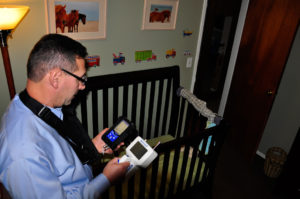Long Island Air Quality Testing
Mold in your home is not something you want. Not only does it ruin your décor, but it can also trigger an assortment of medical problems. Overexposure to toxic mold is known to impair respiratory health and brain function, as well as other side effects. Unfortunately, many homeowners do not suspect mold until they see it. This is because mold is not always visible to the naked eye and may even be hidden in attics, crawlspaces, and other remote areas of your home. However, when you turn to a home mold inspector, they have the knowledge and wherewithal to find the lurking mold issues.
While the thought of an unknown mold infestation can send chills down your spine, there is no reason to lose hope. A professional home mold inspector can systematically investigate your home for hidden mold. On top of that, a mold inspector can help you start your remediation efforts on the right foot by identifying the type and size of the problem accurately. Get in touch with us today to get started with a professional home mold inspector.
When you reach out to us, we can set up an appointment to come down and inspect your home for mold. Investigating mold problems is easier said than done. Unless you are careful, you may disturb the mold growth and release spores throughout the home. This is why it is best to let home mold inspectors take on the job. Besides taking all the necessary precautions, our team will leave no stone unturned to ensure your safety and well-being!
What is Mold Inspection and Testing?
A mold inspection will alert you to mold growing inside your home. Professional home mold inspectors examine your property to locate signs of excess moisture, water damage, and active infestations. Then there is mold testing, which is all about diagnosing the kinds of mold lurking inside a home. In general, testing for mold involves two aspects:
- Air Testing: Checking the concentration of mold spores in your indoor air.
- Surface Testing: Swabbing household surfaces to find the number of mold spores deposited around the home.
 A certified mold inspector can also check in on the following aspects:
A certified mold inspector can also check in on the following aspects:
- Confirm if there is a mold problem.
- Gauge the severity of the mold infestation.
- Look for evidence of previous mold infestations.
- Detect hidden moisture leaks that may be causing the growth of mold.
- Recommend preventative tactics and a mold removal plan.
- Check HVAC systems.
- Moisture-map the entire house.
There are several reasons why you should schedule frequent mold inspections for your home. Do not let these issues linger and get them checked on sooner rather than later.
When To Consider Hiring a Home Mold Inspector
Here are a few situations that warrant professional mold testing and inspections:
- Water Damage: If you have been dealing with a host of floods, leaks, and sprays recently, you should inspect for mold. Any surface that wasn’t dried quick enough may get some mold growth.
- Buying an Old Home or Property: A house or building that has been locked up for a long time may have mold outbreaks, especially in areas prone to moisture and warmth.
- After a Mold Remediation: You must test for mold after the removal process is complete to make sure you got rid of it all.
Frequently Asked Questions for a Home Mold Inspector
How Important is a Home Mold Inspection?
A mold inspection, especially in homes with a history of water damage or high humidity, is critical for maintaining a healthy living space. Mold can cause respiratory issues, allergic reactions, and other health problems, particularly for individuals with asthma or weakened immune systems. Mold growth that goes unchecked may also lead to structural damage for the home, which can lead to costly repairs. Hiring a mold inspector gives homeowners the ability to identify visible mold, while also uncovering hidden sources of it. All of this allows for timely remediation and prevents further damage and health risks.
How Often Should My Home Be Inspected for Mold?
Homes should be checked for mold on a yearly basis, especially if you live in an area with high humidity or frequent rainfall. Inspections are very important following flooding, roof leaks, or plumbing issues. More frequent inspections are necessary if your home has a history of mold problems or water damage. Regular inspections will help detect mold early on and potentially prevent costly remediation while also minimizing health risks.
Are Home Mold Tests Worth Purchasing?
Home mold tests can provide a simple identification of mold presence. However, they lack the accuracy and reliability you would get when a professional home mold inspector comes with their equipment. These kits may detect mold spores, but they cannot pinpoint the source or identify the type. Professional testing, combined with an inspection, is more comprehensive and leads to actionable next steps. So proceed with caution when you have a home mold test, but you can supplement it by hiring a professional home mold inspector.
